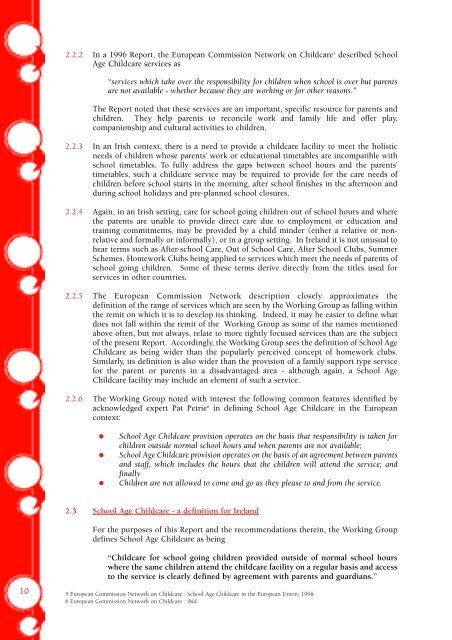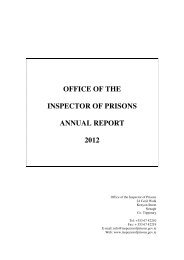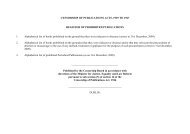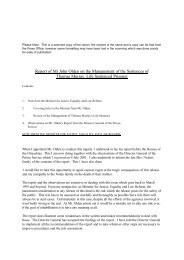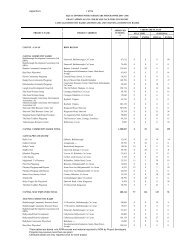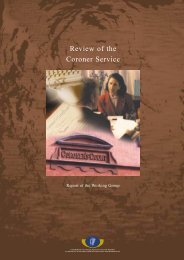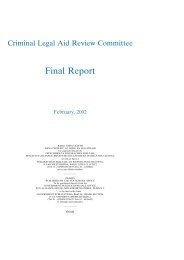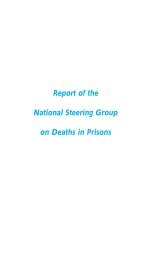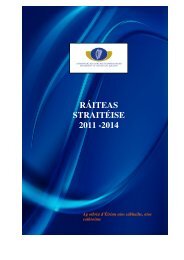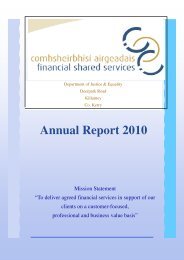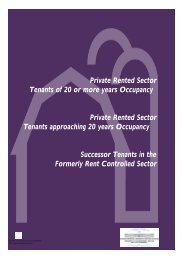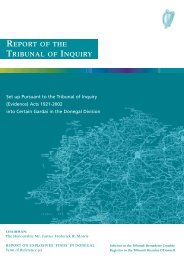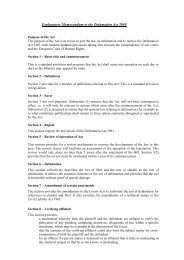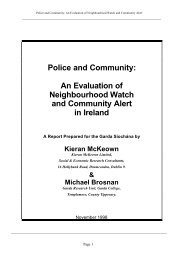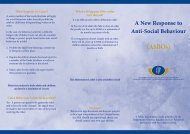Developing School Age Childcare - Department of Children and ...
Developing School Age Childcare - Department of Children and ...
Developing School Age Childcare - Department of Children and ...
You also want an ePaper? Increase the reach of your titles
YUMPU automatically turns print PDFs into web optimized ePapers that Google loves.
2.2.2 In a 1996 Report, the European Commission Network on <strong>Childcare</strong> 5 described <strong>School</strong><strong>Age</strong> <strong>Childcare</strong> services as“services which take over the responsibility for children when school is over but parentsare not available - whether because they are working or for other reasons.”The Report noted that these services are an important, specific resource for parents <strong>and</strong>children. They help parents to reconcile work <strong>and</strong> family life <strong>and</strong> <strong>of</strong>fer play,companionship <strong>and</strong> cultural activities to children.2.2.3 In an Irish context, there is a need to provide a childcare facility to meet the holisticneeds <strong>of</strong> children whose parents’ work or educational timetables are incompatible withschool timetables. To fully address the gaps between school hours <strong>and</strong> the parents’timetables, such a childcare service may be required to provide for the care needs <strong>of</strong>children before school starts in the morning, after school finishes in the afternoon <strong>and</strong>during school holidays <strong>and</strong> pre-planned school closures.2.2.4 Again, in an Irish setting, care for school going children out <strong>of</strong> school hours <strong>and</strong> wherethe parents are unable to provide direct care due to employment or education <strong>and</strong>training commitments, may be provided by a child minder (either a relative or nonrelative<strong>and</strong> formally or informally), or in a group setting. In Irel<strong>and</strong> it is not unusual tohear terms such as After-school Care, Out <strong>of</strong> <strong>School</strong> Care, After <strong>School</strong> Clubs, SummerSchemes, Homework Clubs being applied to services which meet the needs <strong>of</strong> parents <strong>of</strong>school going children. Some <strong>of</strong> these terms derive directly from the titles used forservices in other countries.2.2.5 The European Commission Network description closely approximates thedefinition <strong>of</strong> the range <strong>of</strong> services which are seen by the Working Group as falling withinthe remit on which it is to develop its thinking. Indeed, it may be easier to define whatdoes not fall within the remit <strong>of</strong> the Working Group as some <strong>of</strong> the names mentionedabove <strong>of</strong>ten, but not always, relate to more tightly focused services than are the subject<strong>of</strong> the present Report. Accordingly, the Working Group sees the definition <strong>of</strong> <strong>School</strong> <strong>Age</strong><strong>Childcare</strong> as being wider than the popularly perceived concept <strong>of</strong> homework clubs.Similarly, its definition is also wider than the provision <strong>of</strong> a family support type servicefor the parent or parents in a disadvantaged area - although again, a <strong>School</strong> <strong>Age</strong><strong>Childcare</strong> facility may include an element <strong>of</strong> such a service.2.2.6 The Working Group noted with interest the following common features identified byacknowledged expert Pat Petrie 6 in defining <strong>School</strong> <strong>Age</strong> <strong>Childcare</strong> in the Europeancontext:<strong>School</strong> <strong>Age</strong> <strong>Childcare</strong> provision operates on the basis that responsibility is taken forchildren outside normal school hours <strong>and</strong> when parents are not available;<strong>School</strong> <strong>Age</strong> <strong>Childcare</strong> provision operates on the basis <strong>of</strong> an agreement between parents<strong>and</strong> staff, which includes the hours that the children will attend the service; <strong>and</strong>finally<strong>Children</strong> are not allowed to come <strong>and</strong> go as they please to <strong>and</strong> from the service.2.3 <strong>School</strong> <strong>Age</strong> <strong>Childcare</strong> - a definition for Irel<strong>and</strong>For the purposes <strong>of</strong> this Report <strong>and</strong> the recommendations therein, the Working Groupdefines <strong>School</strong> <strong>Age</strong> <strong>Childcare</strong> as being“<strong>Childcare</strong> for school going children provided outside <strong>of</strong> normal school hourswhere the same children attend the childcare facility on a regular basis <strong>and</strong> accessto the service is clearly defined by agreement with parents <strong>and</strong> guardians.”10 5 European Commission Network on <strong>Childcare</strong> : <strong>School</strong> <strong>Age</strong> <strong>Childcare</strong> in the European Union: 19966 European Commission Network on <strong>Childcare</strong> : ibid.


